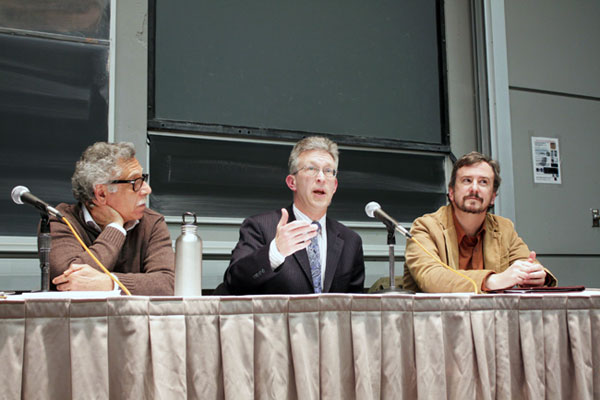Protestors have filled Tahrir Square in Cairo, Egypt, for over two weeks, demanding the immediate resignation of President Hosni Mubarak. The protests have grabbed the attention of media outlets around the world and subsequently sparked discussions about what is happening in the North African country.
One of those discussions took a formal front on Tuesday, Feb. 8, at Northern Michigan University, as a panel of Northern professors addressed a full West Science lecture hall of students, staff and community members about what caused the recent uprising and what possible results might arise from them. The panel consisted of Professor Emeritus Bob Kulishack and Assistant Professor Jonathan Allen of the Political Science department, Associate History Professor Keith Kendall and HPER Professor Mohey Mowafy.

“I was really pleased with the event,” Kendall said. “I liked the variety of approaches.”
Kendall, who teaches Arab/Islamic history class, talked about infrastructure problems of democracies and religion and the impact of foreign influences. Allen specialized in regime changes, while Kulishack used a series of rhetorical questions to get the audience to think about realist versus idealist views. However, Mowafy, who was born in Egypt and witnessed the 1952 Egyptian revolution, added an anecdotal and first-hand perspective to the panel.
“The last 30 years have been nothing but humiliations,” Mowafy said during the discussion. “You get to a point when you have nothing left to lose.”
Each panelist had different predictions of how the uprising in Egypt would end. The two political science professors said they thought it would either end in the hands of the protesters, with a peaceful resignation of Mubarak or a possibly violent uprising, ending the torture of political prisoners. However, Mowafy warned that the immediate resignation of the president could send the country into a political dead spin.
“According to the Egyptian Constitution, you have to elect a new president in 60 days,” Mowafy said. “Right now there are no political parties in Egypt because they have either left or are a political prisoner. There is no one there to unite the country.”
However, the panel agreed that the likeliness of Egypt being a strong ally of the United States under the new government compared to the thirty years of Mubarak’s rule will not be high. And while Mowafy warned that the U.S. should not look at Egypt’s people as ‘scumbags’ for a weaker friendship, Kulishack believes that the U.S. should not try to hand-pick the new president.
“(The U.S.) had a long friendship with the Shah of Iran, and it ended horribly because we ignored the civil and human rights problems,” Kulishack said. “This can be considered as American enlightenment. We should look at things like economics and security, but also factor in our humanistic and democratic ideals.”
After the panelist’s statements, political science department head Brian Cherry opened the floor to questions. Students and staff were able to ask questions about the impact of social media, the Muslim Brotherhood, an Islamic group looking to be included in the post-Mubarak government and what Americans can do to help Egyptian protesters.
Zach Fairchild and Sean Hobbins were two of the students who went to the panel and were happy about the discussion that took place, but were disappointed by the lack of turnout, despite the full lecture hall.
“It was very informative and balanced, but the lack of student awareness for this event is alarming,” Fairchild said. “This is a major world event and less than one percent of the student body showed up. (The students) could have easily filled Jamrich 102 or the Reynolds Recital Hall.”
Hobbins added that more faculty could have further enriched the overall experience.
“I would like more of the (political science) professors here,” he said. “Just to be able to add in the discussion and the question and answer would have done a lot.”
As the protesting and eventual change in government happen in Egypt, the time period for full results will be far in the future, Kendall said.
“It took (the U.S.) 500 years for our secular government and 200 years for our democracy. You can’t expect Egypt to figure this out by the 11 o’clock news.”























